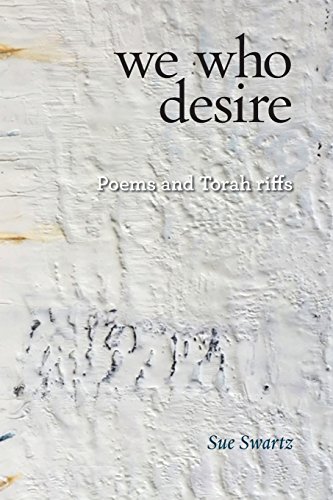We Who Desire: Poems and Torah Riffs
From Genesis to Deuteronomy, from “Bereshit” to “Zot Haberacha,” from Eden to Gaza, from Eve to Emma Goldman, “we who desire” interweaves the mythic and the mundane as it follows the arc of the Torah with carefully chosen words, astute observations, and deep emotion. “”we who desire” began as daily writing practice, a poem on
From Genesis to Deuteronomy, from “Bereshit” to “Zot Haberacha,” from Eden to Gaza, from Eve to Emma Goldman, “we who desire” interweaves the mythic and the mundane as it follows the arc of the Torah with carefully chosen words, astute observations, and deep emotion.
“”we who desire” began as daily writing practice, a poem on the weekly Torah portion. I refined, edited, slashed, leaving only those words that tell a story, the real story of creation and covenant, liberation and desire. Especially desire. I have turned it and turned it for decades, this manual of instruction, this text that called me into forever. Turned it until the words felt right, until I was able to admit its hold on me. Fire and splendor. Fire and splendor.” -Sue Swartz
Sue Swartz has used a brilliant, fortified, playful, serious, humanely furious moral imagination, and a poet’s love of the music of language, to re-tell the saga of the Bible you thought you knew-and make its implications crystal clear for the life you are right now living. Amen. -Alicia Ostriker, author, “For the Love of God: The Bible as an Open Book”
Consistently on key, Swartz’s lyrical voice moves deftly between the Biblical past and our gritty, contemporary moment-often interweaving the two in surprising ways. -Yehoshua November, author, “God’s Optimism”
Sue Swartz does magnificent acrobatics with the Torah in We Who Desire. She takes the English that’s become staid and boring, and adds something that’s new and strange and exciting. These are poems that leave a taste in your mouth, and you walk away from them thinking, what did I just read? Oh, yeah. It’s the Bible. -Matthue Roth, author, “Yom Kippur A Go-Go,” “My First Kafka”
It is more than their accessibility that marks Sue Swartz’s poems as special – it is the access they give the reader to sudden emotion: wonder, desire, laughter, hurt. Swartz has taken the well-worn motif of Torah commentary-in-verse and created something entirely new and entirely wonderful. -Lawrence Bush, author, “American Torah Toons,” “Waiting for God: The Spiritual Explorations of a Reluctant Atheist””







Comments